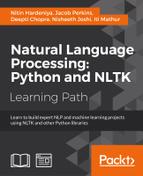In order to carry out processing on natural language text, we need to perform normalization that mainly involves eliminating punctuation, converting the entire text into lowercase or uppercase, converting numbers into words, expanding abbreviations, canonicalization of text, and so on.
Sometimes, while tokenizing, it is desirable to remove punctuation. Removal of punctuation is considered one of the primary tasks while doing normalization in NLTK.
Consider the following example:
>>> text=[" It is a pleasant evening.","Guests, who came from US arrived at the venue","Food was tasty."] >>> from nltk.tokenize import word_tokenize >>> tokenized_docs=[word_tokenize(doc) for doc in text] >>> print(tokenized_docs) [['It', 'is', 'a', 'pleasant', 'evening', '.'], ['Guests', ',', 'who', 'came', 'from', 'US', 'arrived', 'at', 'the', 'venue'], ['Food', 'was', 'tasty', '.']]
The preceding code obtains the tokenized text. The following code will remove punctuation from tokenized text:
>>> import re
>>> import string
>>> text=[" It is a pleasant evening.","Guests, who came from US arrived at the venue","Food was tasty."]
>>> from nltk.tokenize import word_tokenize
>>> tokenized_docs=[word_tokenize(doc) for doc in text]
>>> x=re.compile('[%s]' % re.escape(string.punctuation))
>>> tokenized_docs_no_punctuation = []
>>> for review in tokenized_docs:
new_review = []
for token in review:
new_token = x.sub(u'', token)
if not new_token == u'':
new_review.append(new_token)
tokenized_docs_no_punctuation.append(new_review)
>>> print(tokenized_docs_no_punctuation)
[['It', 'is', 'a', 'pleasant', 'evening'], ['Guests', 'who', 'came', 'from', 'US', 'arrived', 'at', 'the', 'venue'], ['Food', 'was', 'tasty']]A given text can be converted into lowercase or uppercase text entirely using the functions lower() and upper(). The task of converting text into uppercase or lowercase falls under the category of normalization.
Consider the following example of case conversion:
>>> text='HARdWork IS KEy to SUCCESS' >>> print(text.lower()) hardwork is key to success >>> print(text.upper()) HARDWORK IS KEY TO SUCCESS
Stop words are words that need to be filtered out during the task of information retrieval or other natural language tasks, as these words do not contribute much to the overall meaning of the sentence. There are many search engines that work by deleting stop words so as to reduce the search space. Elimination of stopwords is considered one of the normalization tasks that is crucial in NLP.
NLTK has a list of stop words for many languages. We need to unzip datafile so that the list of stop words can be accessed from nltk_data/corpora/stopwords/:
>>> import nltk
>>> from nltk.corpus import stopwords
>>> stops=set(stopwords.words('english'))
>>> words=["Don't", 'hesitate','to','ask','questions']
>>> [word for word in words if word not in stops]
["Don't", 'hesitate', 'ask', 'questions']The instance of nltk.corpus.reader.WordListCorpusReader is a stopwords corpus. It has the words() function, whose argument is fileid. Here, it is English; this refers to all the stop words present in the English file. If the words() function has no argument, then it will refer to all the stop words of all the languages.
Other languages in which stop word removal can be done, or the number of languages whose file of stop words is present in NLTK can be found using the fileids() function:
>>> stopwords.fileids() ['danish', 'dutch', 'english', 'finnish', 'french', 'german', 'hungarian', 'italian', 'norwegian', 'portuguese', 'russian', 'spanish', 'swedish', 'turkish']
Any of these previously listed languages can be used as an argument to the words() function so as to get the stop words in that language.
Let's see an example of how to calculate stopwords:
>>> import nltk
>>> from nltk.corpus import stopwords
>>> stopwords.words('english')
['i', 'me', 'my', 'myself', 'we', 'our', 'ours', 'ourselves', 'you', 'your', 'yours', 'yourself', 'yourselves', 'he', 'him', 'his', 'himself', 'she', 'her', 'hers', 'herself', 'it', 'its', 'itself', 'they', 'them', 'their', 'theirs', 'themselves', 'what', 'which', 'who', 'whom', 'this', 'that', 'these', 'those', 'am', 'is', 'are', 'was', 'were', 'be', 'been', 'being', 'have', 'has', 'had', 'having', 'do', 'does', 'did', 'doing', 'a', 'an', 'the', 'and', 'but', 'if', 'or', 'because', 'as', 'until', 'while', 'of', 'at', 'by', 'for', 'with', 'about', 'against', 'between', 'into', 'through', 'during', 'before', 'after', 'above', 'below', 'to', 'from', 'up', 'down', 'in', 'out', 'on', 'off', 'over', 'under', 'again', 'further', 'then', 'once', 'here', 'there', 'when', 'where', 'why', 'how', 'all', 'any', 'both', 'each', 'few', 'more', 'most', 'other', 'some', 'such', 'no', 'nor', 'not', 'only', 'own', 'same', 'so', 'than', 'too', 'very', 's', 't', 'can', 'will', 'just', 'don', 'should', 'now']
>>> def para_fraction(text):
stopwords = nltk.corpus.stopwords.words('english')
para = [w for w in text if w.lower() not in stopwords]
return len(para) / len(text)
>>> para_fraction(nltk.corpus.reuters.words())
0.7364374824583169
>>> para_fraction(nltk.corpus.inaugural.words())
0.5229560503653893Normalization may also involve converting numbers into words (for example, 1 can be replaced by one) and expanding abbreviations (for instance, can't can be replaced by cannot). This can be achieved by representing them in replacement patterns. This is discussed in the next section.
